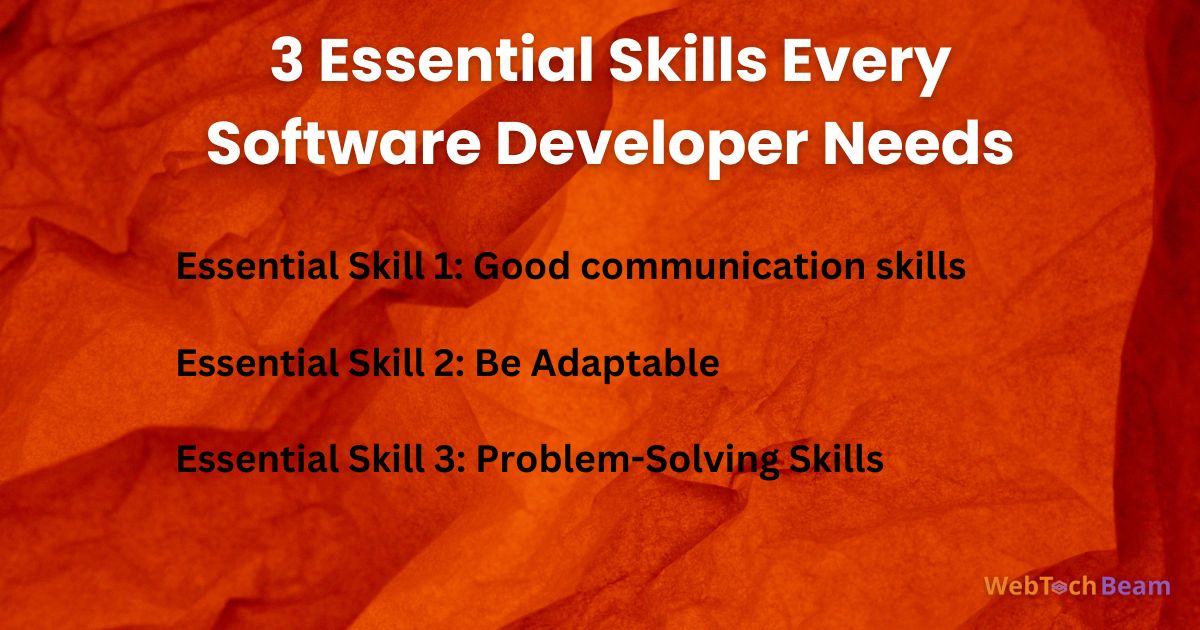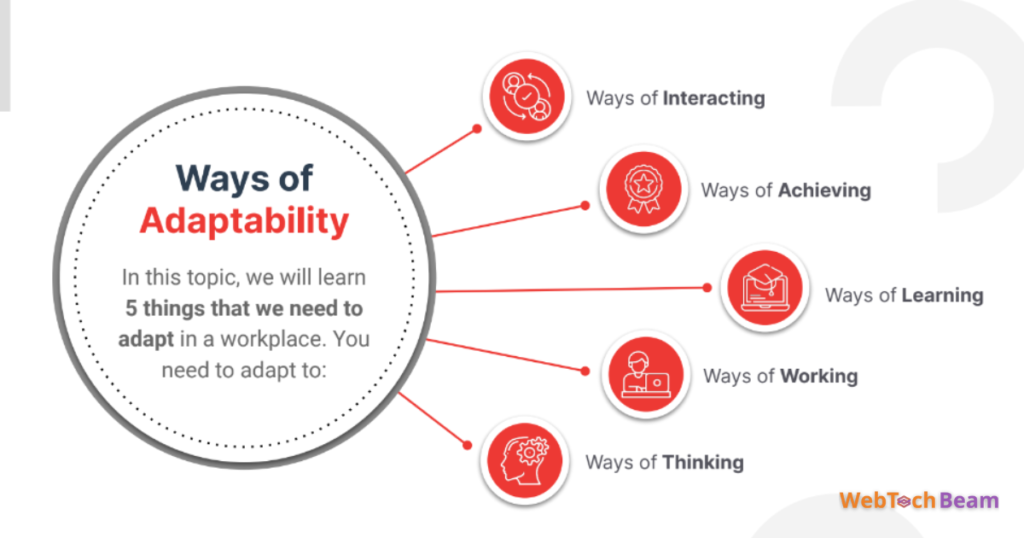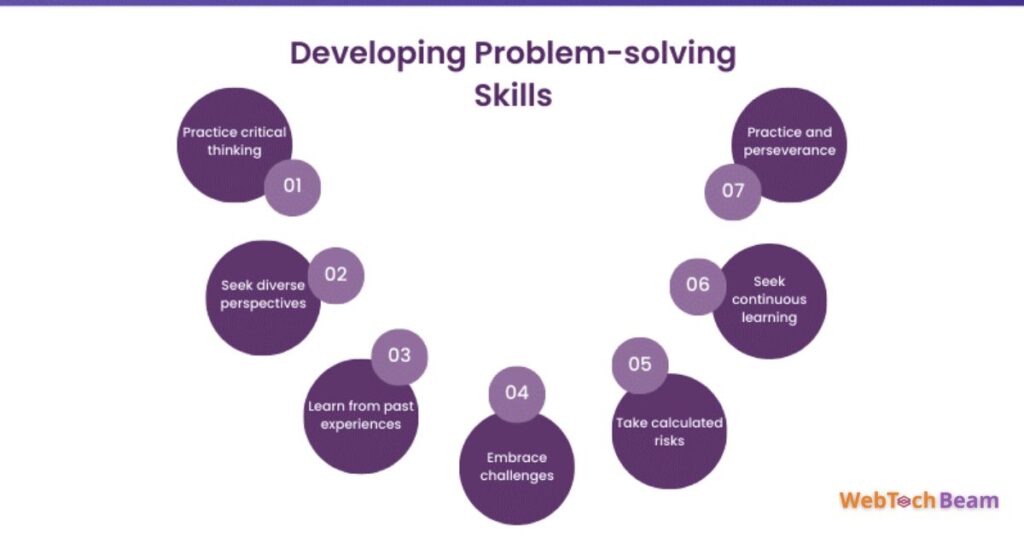The 3 Essential Skills Every Software Developer Needs

The tech industry moves fast. New tools and technologies are always coming out, which keeps the demand for good software developers high. If you want to build a strong career, staying up-to-date is essential. Whether you work in gaming or cybersecurity; you must stay updated with the latest trends.
You can’t just get by with writing excellent code. It takes other skills to ensure you will always be relevant within your field. This article will review 3 Essential Skills Every Software Developer Needs you should constantly hone to be an in-demand software developer.
Essential Skill 1: Good communication skills
Good communication is a must for any software developer. Misunderstandings can lead to mistakes in your code, missed deadlines, and frustrated teammates.
Writing code is just one part of the job; you must also work well with others. You could be working with fellow developers or explaining things to people who aren’t as tech-savvy, so how you talk and share ideas can make a big difference. Clear and straightforward communication helps everyone stay on track and avoid confusion.
It’s also helpful to explain why you made certain decisions in your code. You’ll often need to write documentation or leave notes in your code so others can follow along. And when it comes to giving or receiving feedback, good communication makes everything easier. It can boost teamwork and help solve problems faster, making your work smoother overall.
How to Improve Communication Skills
Practice Writing Clear Documentation
- Writing clear documentation helps others understand your code and workflow better. Good documentation ensures that anyone can follow your work without confusion or delay. Organize your documentation into clear sections to guide others through your project easily. Use simple language when explaining complex processes or technical functions to avoid misunderstandings. Well-written documentation helps team members maintain and scale projects effectively.
Collaborate on Team Projects
- Working with others improves communication skills through real-time discussions and problem-solving. During collaboration, always listen actively to understand what your teammates need or suggest. Be clear and concise when explaining your thoughts to avoid confusion in team settings. Ask questions when unclear, and offer feedback to ensure open communication. Collaborating helps develop better interpersonal and team-based communication strategies for future projects.
Improve Technical Writing
Practice writing technical blog posts or tutorials to make complex ideas easier to understand. Clear explanations help others learn from your work and enhance their skills. Technical writing forces you to think about communicating complex topics clearly and effectively. Use real-life examples to make your technical content more relatable and accessible. Improving technical writing skills boosts your ability to explain ideas to technical and non-technical audiences.
Essential Skill 2: Be Adaptable

Adaptability and a willingness to learn are two of the most essential qualities for a software developer. The tech industry moves fast, and new tools, languages, and methods are constantly being introduced.
When you’re not adaptable, it’s easy to fall behind. You struggle to take on new projects or miss out on opportunities because you’re unfamiliar with the latest technologies. Also, if others are adopting new tools or processes and you resist change, it can slow everyone down.
Being flexible helps you take on new challenges and opportunities as they come. It lets you quickly pick up new programming languages or adopt new frameworks. It’s also what keeps your work interesting, as you’ll be able to explore new areas of development.
B. How to Develop Adaptability
Continuous Learning
Attend webinars and online courses to stay updated on industry trends and skills. Following industry blogs helps you learn about new tools and best practices in real time. Experimenting with new technologies allows you to discover innovative ways to solve problems. Join online communities to share knowledge and gain insights from other developers. Continuous learning keeps your skills fresh and prepares you for future challenges.
Embrace Failure as a Learning Opportunity
Understanding that mistakes happen helps you become a more resilient developer. Analyze your failures to identify what went wrong and how to improve next time. Each mistake offers valuable lessons that make you a better problem solver in the future. Learning from setbacks encourages you to take more risks and explore creative solutions. Resilience helps you bounce back and tackle new challenges with confidence.
Stay Curious and Flexible
Explore different programming languages to broaden your skill set and adaptability. Working on diverse projects helps you gain experience in various coding environments. Being curious pushes you to seek out new information and technologies regularly. Flexibility in your approach allows you to adapt to changing project requirements quickly. Stay open to learning from peers, mentors, and new resources to grow your skills.
C. Real-World Example
A developer quickly learned a new framework to enhance an existing app’s functionality.
The team faced challenges with outdated technology that slowed their project’s progress. The developer improved the app’s performance and user experience by embracing the new framework. This adaptability allowed the team to meet deadlines and exceed client expectations successfully. The developer’s willingness to learn significantly impacted the project’s overall success.
Essential Skill 3: Problem-Solving Skills

A. Explanation
Definition
Problem-solving in software development involves finding and fixing issues, improving code, and solving challenges. Developers often solve bugs, optimize performance, and create solutions for complex coding problems. It includes understanding the problem, breaking it down, and making steps to reach a solution. Good problem-solving requires critical thinking and approaching issues from different angles. The process involves testing, debugging, and refining until the best solution is found.
Importance
Problem-solving is essential because it helps developers create reliable and efficient software.
Developers who solve problems quickly can deliver better software products to clients and users. It ensures that software functions correctly, with fewer errors or performance issues. Effective problem-solving improves productivity, saving time and resources in software projects. Mastering this skill allows developers to tackle new challenges as technologies evolve.
B. How to Develop Problem-Solving Skills
Practice with Coding Challenges
Use coding challenge platforms like LeetCode and HackerRank to improve your problem-solving skills. These platforms present real-world coding problems that sharpen your logical and analytical thinking. Solving these challenges regularly helps you think faster and find better solutions to code problems. Coding challenges teach you how to approach unfamiliar problems in a structured and efficient way. Practicing on these sites builds confidence and improves your problem-solving speed over time.
Learn from Real-World Scenarios
Contributing to open-source projects lets you solve real issues and gain hands-on experience. By fixing bugs or adding features, you develop practical problem-solving skills that matter in real projects. Learning from real-world projects allows you to solve more complex and varied problems. This experience teaches you how to work with a team while tackling real software challenges. Solving real problems helps you understand how solutions are applied in professional software development.
Understand Algorithms and Data Structures
Understanding algorithms and data structures is crucial for developing efficient problem-solving skills. These concepts form the foundation of most coding problems and solutions in software development. Algorithms help you solve problems faster, while data structures organize your data effectively. Learning these topics enables you to approach complex issues more brightly and efficiently. Mastering them ensures that your solutions are both practical and optimized for performance.
C. Real-World Example
A developer saved a project by solving a performance issue with the app’s search function. The app was slow due to inefficient algorithms, making users wait for search results. By applying better algorithms and data structures, the developer improved the search speed significantly. The solution increased user satisfaction and helped the app succeed in a competitive market. This shows how problem-solving directly impacts the performance and success of software projects.
Conclusion
Problem-solving skills help developers identify and fix issues efficiently in their code.
Effective communication allows developers to collaborate successfully with team members and stakeholders. Adaptability helps developers learn new technologies and overcome changing project requirements quickly. Mastering these three skills makes a developer more versatile and valuable in any team setting.
Developers who master these skills become not only competent but also reliable team players. Being good at problem-solving, communication, and adaptability sets you apart in the tech field. These skills enhance your ability to contribute positively to projects and teams. Investing in these skills can lead to more excellent opportunities in your software development career.
Start practicing your problem-solving skills through coding challenges and real-world projects today. Join workshops and online courses to enhance your communication and adaptability skills. Take the first step to develop these essential skills and advance your career now. Embrace a continuous learning mindset to grow and succeed in software development.





